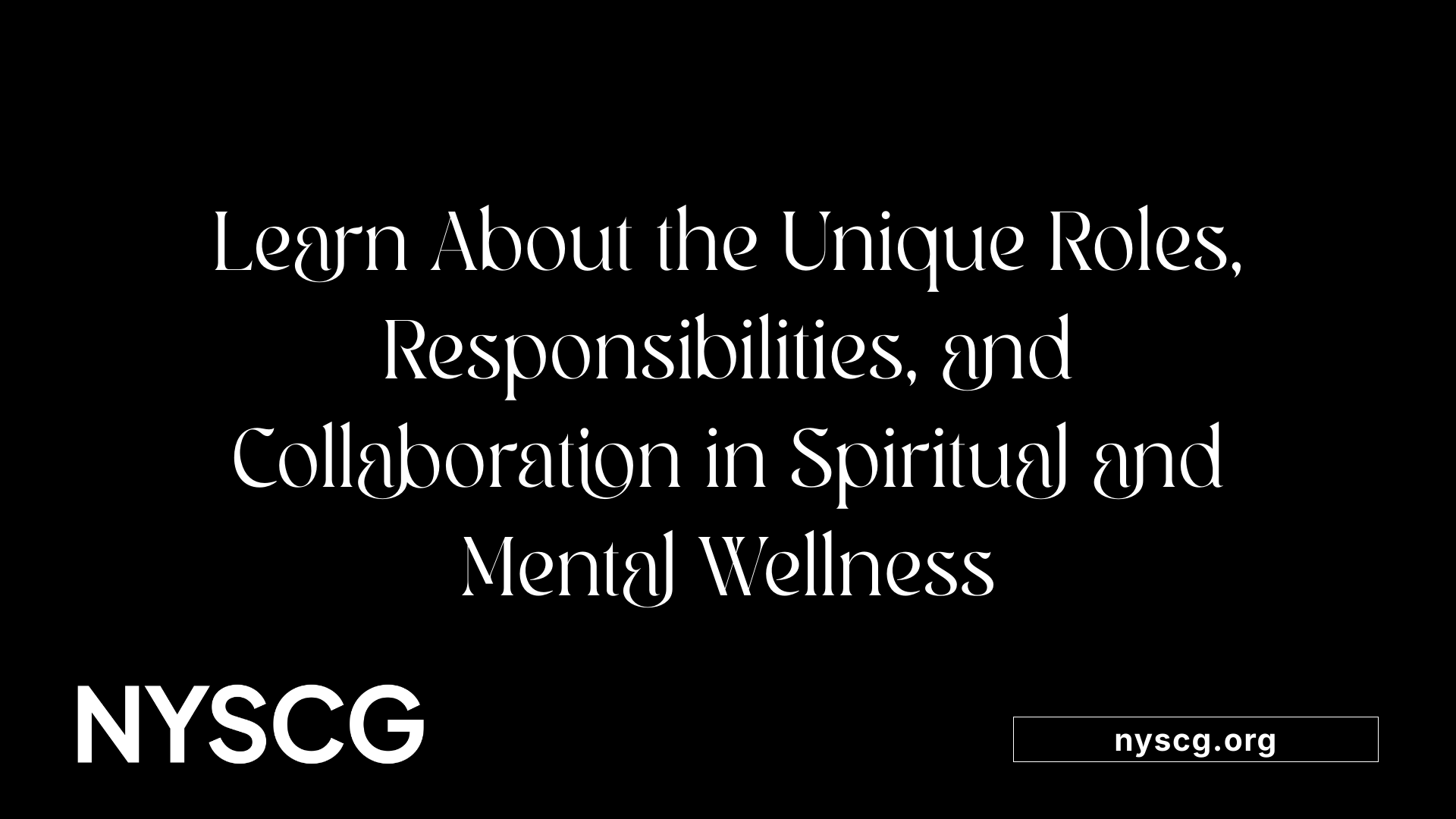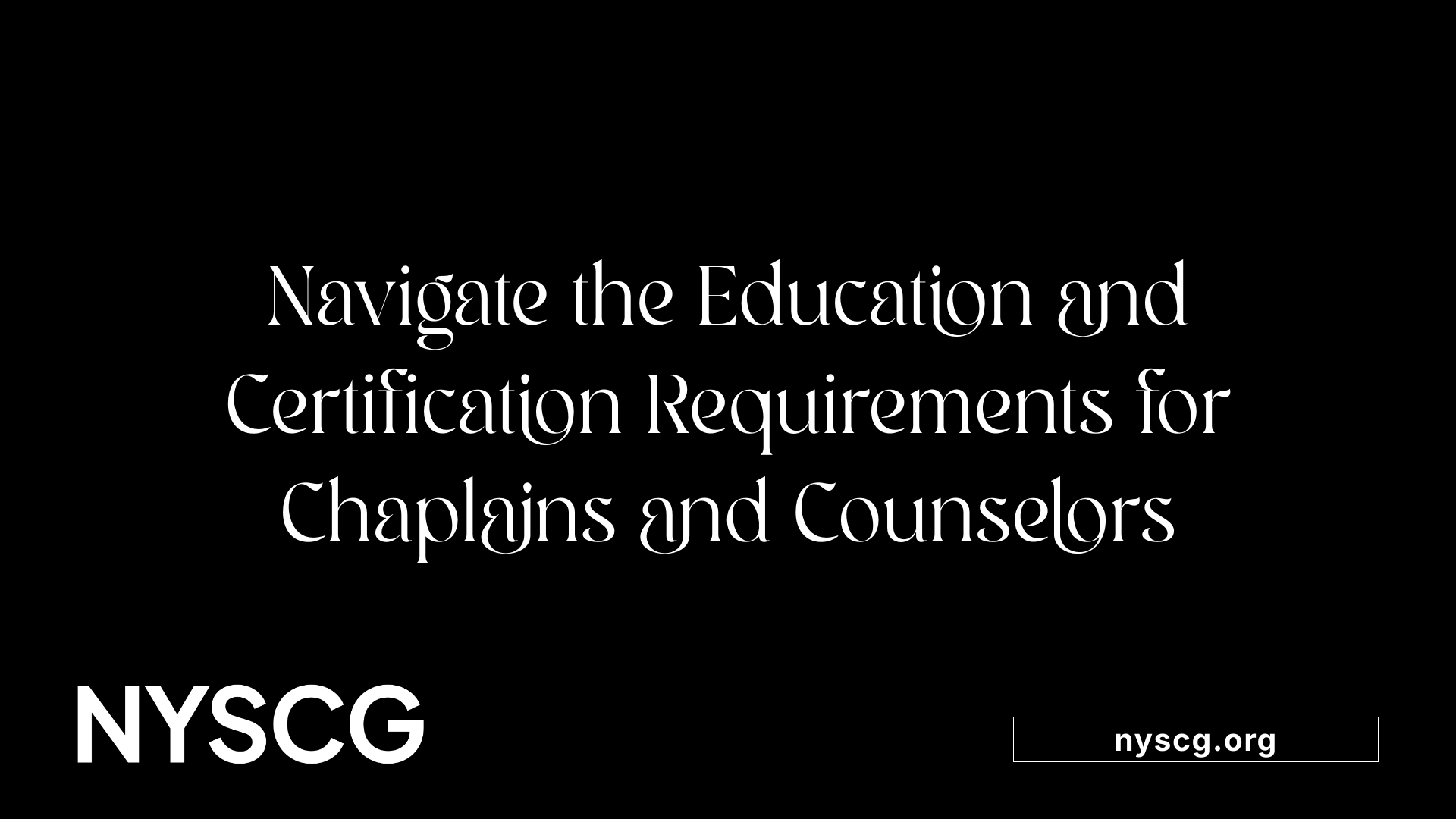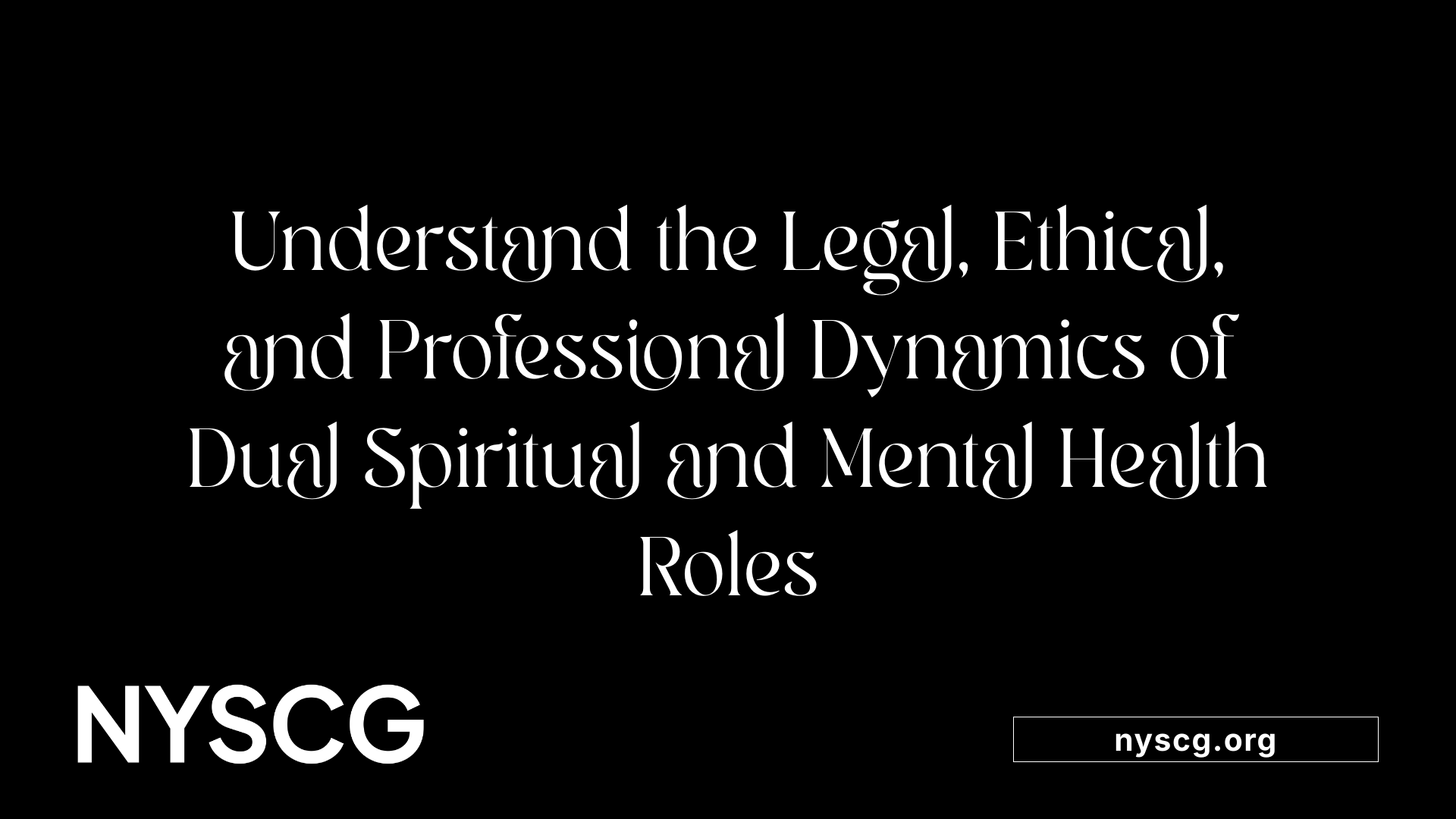Is It Possible to Be Both a Chaplain and a Counselor?


As the demand for comprehensive emotional and spiritual support increases across healthcare, military, and educational settings, many professionals wonder if it's feasible to serve as both a chaplain and a counselor. This article explores the roles, qualifications, ethical considerations, and career pathways associated with holding dual roles, highlighting the opportunities and challenges within these intertwined fields.

Chaplains, especially in hospitals, military bases, and community organizations, focus on providing spiritual guidance, religious rites, and crisis intervention. They often help patients and families cope with illness, trauma, and end-of-life decisions. For example, hospital chaplains listen to patients’ struggles, support families through difficult conversations about terminal illnesses, and work alongside healthcare teams to meet the spiritual needs of those under their care.
In military environments, chaplains tend to the spiritual and emotional well-being of service members and their families. They offer worship services, conduct religious ceremonies, and provide confidential counseling in high-stress situations, including combat zones. In community settings, chaplains may serve as moral and spiritual advisors, often working with diverse populations and fostering resilience through support and presence.
Counselors, on the other hand, primarily focus on mental health and emotional well-being. They work in clinical environments or community organizations, utilizing evidence-based techniques such as cognitive-behavioral therapy or trauma-informed care. Their responsibilities include diagnosing mental health conditions, developing treatment plans, and providing therapy to help clients manage issues like anxiety, depression, relationships, or trauma.
Both roles emphasize confidentiality, ethical conduct, and advocating for their clients. While chaplains provide spiritual and emotional support rooted in faith and religious practice, counselors typically address psychological health through structured therapy aimed at healing and personal growth.
Role TypeMain FocusTypical SettingsAdditional ResponsibilitiesChaplainSpiritual guidance, religious rites, crisis supportHospitals, military, prisons, community organizationsConducting worship, conducting sacred ceremonies, offering grief supportCounselorMental health therapy, emotional supportClinics, private practice, schoolsDiagnosing, treatment planning, therapy sessions
While their functions vary, chaplains and counselors often collaborate, especially in healthcare environments, to provide comprehensive support. Understanding each profession’s scope helps in choosing the appropriate form of assistance during life's difficult moments. Both roles are integral in fostering healing and hope for individuals across a broad spectrum of circumstances.

Becoming a hospital chaplain generally begins with obtaining a bachelor's degree, often in a field like religious studies, theology, or a related area. This foundational education is followed by a master's degree in divinity, theology, or similar disciplines, which prepares individuals for spiritual leadership roles.
A crucial component of training for chaplains is the completion of Clinical Pastoral Education (CPE), which involves practical hands-on experience in a clinical setting. Accredited CPE programs at hospitals, hospices, or religious institutions develop essential pastoral skills and are often required or highly recommended.
Certification from professional bodies and endorsement from faith groups are important, especially for those supporting diverse religious communities. While licensure is not mandatory universally, some states or institutions may require additional credentials or background checks. Many chaplains also complete residencies or internships to strengthen their practical and pastoral expertise.
In contrast, licensure for counselors, such as pastoral counselors or mental health professionals, typically requires at least a master's degree in counseling, marriage and family therapy, or a related field. These educational programs include coursework in psychological theory, ethical practice, and clinical skills.
To practice professionally, counselors must obtain state licensure, which involves supervised clinical hours, passing licensing exams, and fulfilling additional state-specific criteria. Clinical psychologists, psychiatrists, and social workers often undergo longer training, usually spanning six to eight years, including doctoral or master's degrees and extensive supervised practice.
Both career paths benefit from supplemental training, certifications, and ongoing education to maintain licensure and stay current with best practices. These combined education and training routes enable professionals to serve in diverse settings like hospitals, schools, or community services, providing holistic care grounded in both spiritual and mental health principles.

Professionals interested in combining or transitioning between chaplaincy and counseling can find diverse opportunities across many settings. Hospitals, for example, often employ chaplains who provide spiritual guidance alongside counseling services for patients and families facing health crises. Military environments include chaplains who tend to the spiritual and emotional needs of service members, addressing issues such as grief, moral injury, and stress, often collaborating with mental health professionals.
Educational institutions and correctional facilities are additional avenues where roles may overlap. Chaplains in schools serve as spiritual mentors and counselors, supporting students' well-being beyond religious services. Similarly, correctional facilities employ chaplains to assist inmates with spiritual growth and emotional stability, sometimes functioning as counselors or connecting individuals to mental health resources.
Transitioning from one role to another generally involves acquiring relevant educational backgrounds—such as degrees in counseling, psychology, or theology—and completing Clinical Pastoral Education (CPE) to gain practical experience. Certification from reputable organizations like the Association of Professional Chaplains can improve credibility and job opportunities.
Many professionals enhance their skills through volunteering or part-time roles in healthcare, community, or correctional settings, which helps build practical experience and professional networks. Using platforms like LinkedIn, they can connect with potential employers and explore opportunities.
Advancement in this field might include pursuing higher degrees such as a Master of Divinity (M.Div) or licensure in counseling or social work, which often necessitates supervised clinical hours and passing licensing exams. Continued professional development through workshops, certifications, and leadership training plays a vital role in career growth.
Practical experience is crucial, and many professionals start by volunteering in hospitals, hospices, or community organizations. Formal training in therapeutic interventions and pastoral care enhances one's ability to serve effectively.
Certification from recognized bodies, such as the American Association of Pastoral Counselors or the College of Pastoral Supervision and Psychotherapy, offers validation of skills. Completing CPE units during clinical training programs prepares individuals for real-world settings by providing supervised practical experience.
Having both spiritual and clinical competencies allows individuals to navigate roles flexibly—serving as both spiritual guides and mental health allies. This dual expertise supports holistic care and broadens employment prospects across diverse environments.
SettingTypical RolesQualifications NeededAdditional NotesHospitalsChaplain, pastoral counselor, mental health counselorM.Div, counseling license, CPE unitsWork closely with healthcare teams to support emotional and spiritual needsMilitaryMilitary chaplain, spiritual support advisorM.Div, commission as officer, specialized trainingAlso support morale, conduct religious rites, and crisis interventionEducational institutionsSchool chaplain, counselorM.Div, counseling credentials, school certificationsFocus on student support, mental health, and spiritual guidanceCorrectional facilitiesCorrectional chaplain, counselorM.Div, licensure, experience in high-risk environmentsEmphasize rehabilitation, emotional stability, and spiritual growth
To explore further, look into "Career development pathways for dual chaplain-counselor roles" for detailed routes and advanced training options. Building a career that combines spiritual support and mental health services can be both fulfilling and impactful, especially with ongoing education and credentialing.

Combining chaplaincy and counseling roles is indeed possible but requires diligent ethical and legal navigation. Both professions are viewed as ‘Spiritual Care Professionals’ and are bound by shared ethical standards that emphasize confidentiality, respect, and avoiding conflicts of interest.
Legally, practitioners must work within their scope of practice, which involves adhering to healthcare regulations and patients’ rights laws that protect confidential spiritual or mental health support. This means recognizing the limits of their expertise and seeking consultation or referrals when necessary.
From an ethical standpoint, maintaining clear boundaries is essential. Practitioners must be transparent about their roles to clients and ensure their spiritual advice does not interfere with medical treatments or mental health interventions. When providing guidance on health decisions rooted in religious values, securing informed consent and respecting individual autonomy are paramount.
The integration of these roles can provide more comprehensive support, fostering holistic healing. However, this dual practice demands ongoing ethical reflection, specialized training, and strict adherence to professional standards to safeguard client welfare and uphold trust.
The acceptance of combined or dual roles in chaplaincy and counseling is gradually increasing within the professional sectors. While some remain cautious—mainly due to concerns about professional boundaries and maintaining distinct identities—there's a growing recognition of the potential benefits.
Proponents argue that integrated roles lead to more holistic care, addressing both spiritual and psychological needs, often resulting in better overall outcomes for clients. Academic research supports this view, emphasizing that when these roles are balanced and clearly defined, they can complement each other effectively.
Nevertheless, challenges persist. Questions about professional legitimacy, regulatory compliance, and the risk of role confusion continue to influence acceptance levels. Despite this, the trend shows evolving recognition of the value of integrating spiritual and mental health support, as long as practitioners operate ethically and maintain clarity in their roles.
AspectChallengeOpportunityLegal considerationsOperating beyond scopeEnsuring compliance with lawsEthical boundariesRole confusionEnhancing holistic careProfessional acceptanceRole legitimacyBroader recognition of integrated care
While challenges remain, the evolving landscape of healthcare, military, and community services increasingly recognizes the value of combining spiritual and mental health support. With proper training, adherence to ethical standards, and professional recognition, individuals can successfully embody both roles, providing holistic care tailored to diverse needs. The integration of chaplaincy and counseling not only broadens career opportunities but also enhances the quality of support for individuals navigating complex emotional and spiritual landscapes, ultimately fostering resilience, hope, and healing across settings.
All you need is the will to make the world a better place.
New York State chaplain group inc. is a tax deductible organization with a federal tax Id number 92-383-4921